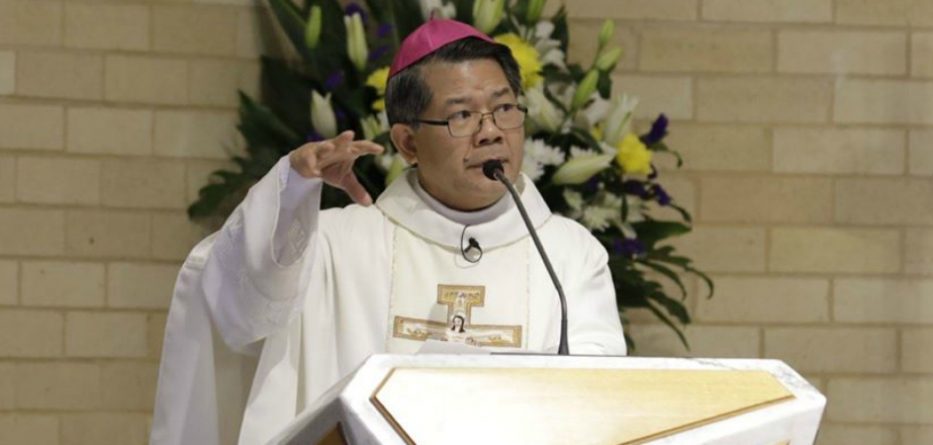Most Reverend Vincent Long Van Nguyen OFM Conv DD STL, Bishop of Parramatta
Homily for the Solemnity of Corpus Christi at St Bernadette’s Parish, Castle Hill
Readings: 8:2-16; 1Cor 10:16-17; John 6:51-58
14 June 2020
Corpus Christi 2020: Nourished and sent out to transform the world
Dear friends,
In the past two weeks, we have witnessed some of the most dramatic events that have profound implications for the way we view history and relate to minority groups in our society. The Black Lives Matter protests began primarily as a social justice and civil rights campaign for African Americans. It intensified following the death of George Floyd and became a global movement against racism, discrimination and brutality against Indigenous peoples.
In America and in Europe, many Confederate statues and symbols of the dark legacy of slavery have been vandalised, destroyed or removed altogether. Some of these have stood proudly as public monuments for decades but now are gone from sight. Even TV shows and films, which are considered to cross a line with their racial caricature have been taken off streaming platforms. It is nothing short of revolutionary.
The movement has triggered a collective soul searching and a consciousness raising exercise. Amid the chaos, confusion and anger in the aftermath of the Black Lives Matter protests and the pandemic, there is a silver lining of sorts: There has been a shift of consciousness as to what is considered acceptable. Not only slavery, segregation, systemic discrimination are deemed unethical but we now also expose the public symbols of that legacy. Few people who have seen the shocking images of Aboriginal men in chains can remain unmoved by the dark chapters of our nation’s history.
As fellow citizens and as people of faith, we stand in solidarity with those who struggle for truth, justice and equity. We must do well to reflect on our mission as agents for societal change, for the dignity of every person and for human flourishing, starting from the most disadvantaged and marginalised.
The feast of Corpus Christi reminds us of our call to follow the way of Jesus, who came that everyone might have a dignified life. We are called to be His body broken and His blood poured out for others. The Eucharist strengthens us and sustains us as we follow the way of Jesus in transforming lives and relationships and thus bringing about God’s plan for all humanity.
Scriptures today speak of transformation as the ultimate goal of Christian discipleship. Moses in the book of Deuteronomy interprets for the people the meaning of their experience in the wilderness. “God humbled you,” he said “made you feel hunger and then fed you with manna… in order to make you understand that man does not live on bread alone but on God’s word.”
In other words, the exodus was a journey that was meant to transform them into God’s faithful people. It was not about physical needs satisfied or even the possession of the Promise Land. They were meant to be God’s faithful people. They were meant to form a society different to the one they had experienced in Egypt, one in which true freedom, justice and human dignity would flourish.
In the Gospel, Jesus also speaks of transformation by means of the gift of himself. He declares that he is the new manna that nourishes and gives the fullness of life. “I am the living bread come down from heaven; and the bread that I shall give is my flesh for the life of the world”. Jesus anticipates the offering of himself on the altar of the cross. Thus, Jesus links what happened in the past with what he would accomplish on Calvary. Manna in the desert foreshadows the real food of life that Jesus would give to us at the table of the Eucharist. Manna was food for the exodus from slavery; but Jesus is the food for the new exodus into complete freedom, wholeness and salvation.
To eat His flesh and to drink His blood is to participate in his life-giving death and resurrection. The Eucharist commits us to be Christ’s transforming presence in the world. For like Him, we must suffer with others, be vulnerable with the vulnerable, be last with the least and be powerless with those without power. This is not something we do alone, but as a community, in communion with Christ and with our brothers and sisters who form His body on earth. So let us become more fully what we already are: Christ’s body broken for others and His blood poured out for many. Let us embrace Jesus’ way of being the transformative force for the world, so that it may truly mirror the Kingdom of peace, justice and love for all.
Corpus Christi touches the very essence of our faith. Today, we give thanks for this gift of Christ’s body and blood. More importantly, we strive to imitate the self-giving nature of our God himself. As we celebrate and share the Eucharist, let us commit ourselves to the journey of transformation. May we grow daily into the Eucharistic Christ who reaches out to all people and leads them to the heart of God. May we model our lives on the one who came to that all have life and have it to the full.
Amen.








